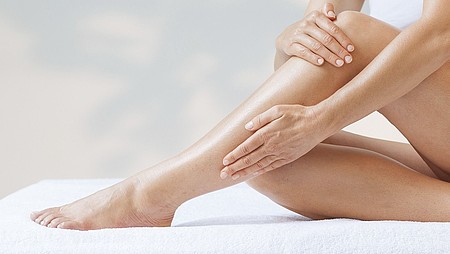Fascia training: exercises for myofascial release
Discover the soothing effect of the specific massaging of local body regions and muscle groups. One of the aims of the myofascial release1 method is to stimulate tissue circulation and thus increase tissue tone. The German Society for Osteopathic Medicine (DGOM e.V.) defines this as: all muscles are enveloped by the so-called fasciae. The fasciae themselves are connected with each other all over the body. The fasciae are stimulated by gentle pressure and tension. This improves the circulation and triggers reactions to normalise tissue tone.2
Exercises with your BLACKROLL® MINI

You can do the exercises for myofascial release with little effort and very effectively with the BLACKROLL® MINI. Discover the soothing effect of a specific massaging of smaller body regions and muscle groups: this relieves muscular tension and can actively support the healing process after injuries. The massage roll is so small and handy that can fit in every holdall.
Fascia training I
Back
Lateral trunk and latissimus
Starting position
- Stand upright
- Place one arm on the opposite shoulder
- Place the BLACKROLL® MINI between wall and thorax underneath your armpit
Exercise
- Roll out your thorax between hip and shoulder by slowly moving up and down
- Vary with pressure by working with your balance point
- When you reach the lowest point near your hip slowly get back into the initial position
- Change sides
Upper arm
Starting position
- Stand upright
- Place the BLACKROLL® MINI between wall and upper arm near your shoulder
Exercise
- By moving up and down roll out your upper arm between elbow and shoulder
- Try changing pressure – both strength and pressure point - by working with your balance point
- When reaching the lowest point on your upper arm slowly return to the initial position
Underarms and hands
Fascia training II
Plantar fascia
Starting position
- Stand upright
- Position the BLACKROLL® MINI under the sole of your foot
Exercise
- Roll back and forth with your foot on the BLACKROLL® MINI from heel to toes
- Repeat with both feet
- Apply pressure on different areas of your feet (heel, ball, right and left side) by working with your balance point on the BLACKROLL® MINI
Shin
Starting position
- Get into an all-fours position
- Support yourself on your toes and lightly angled arms
- Raise your knees just a little
- Position the BLACKROLL® MINI just underneath your knee and put your right shin on it
Exercise
- Roll your shin back and forth on the BLACKROLL® MINI
- Move your leg to the left and right
- The pain should remain bearable: Choose the pressure according to this rule
- Change sides
Calf and achilles tendon
Starting position
- Sit upright on the floor supporting yourself on your hands
- Place the BLACKROLL® MINI under your right calf
- Establish your left leg next to your right knee
Exercise
- Slowly and cautiously roll out your calf
- The well established left leg helps with controlling the exercise as it supports the rolling movement and helps raising your buttocks
- To secure a full roll out of the calf slowly rotate your right leg from left to right
- Change sides
Product tip
The human body
Show sources
1 The word "myofascial" stems from "myo" for muscles and "fascial" for fasciae. Doctors define fasciae as connective tissue structures that surround our muscles and organs.
2 German Society for Osteopathic Medicine (DGOM e.V.) www.dgom.info/fuer-patienten/methoden-der-osteopathie.html











